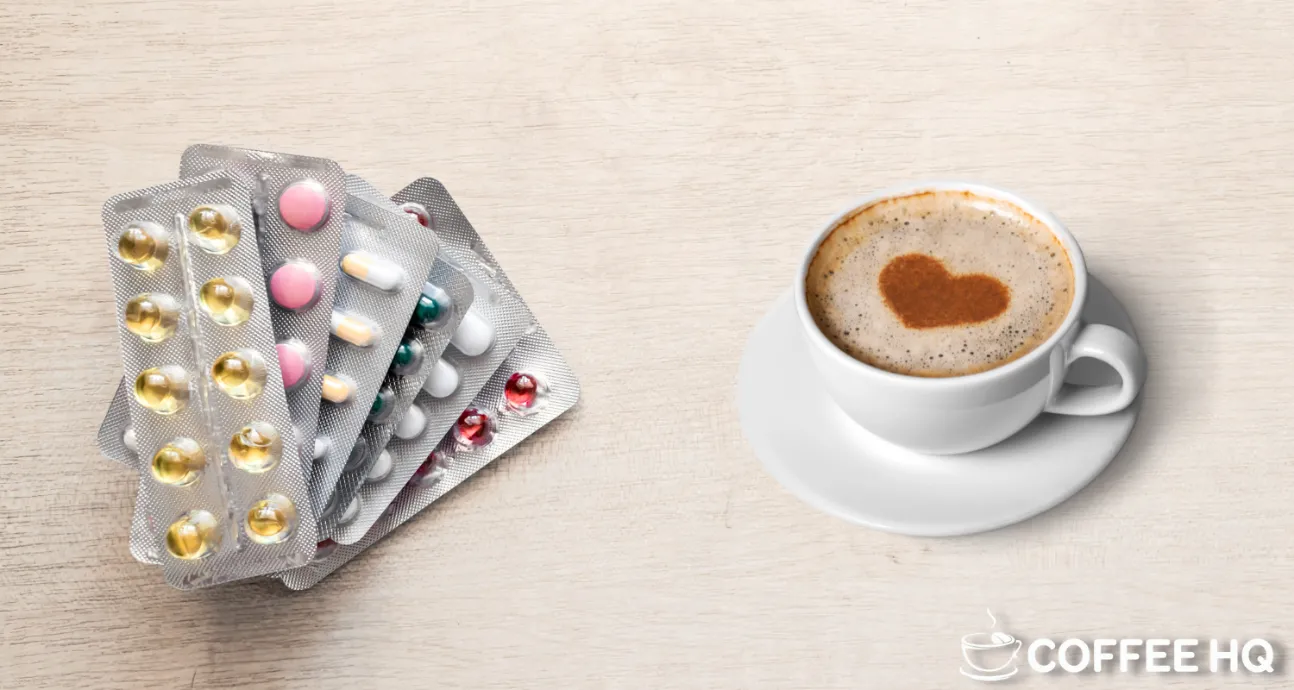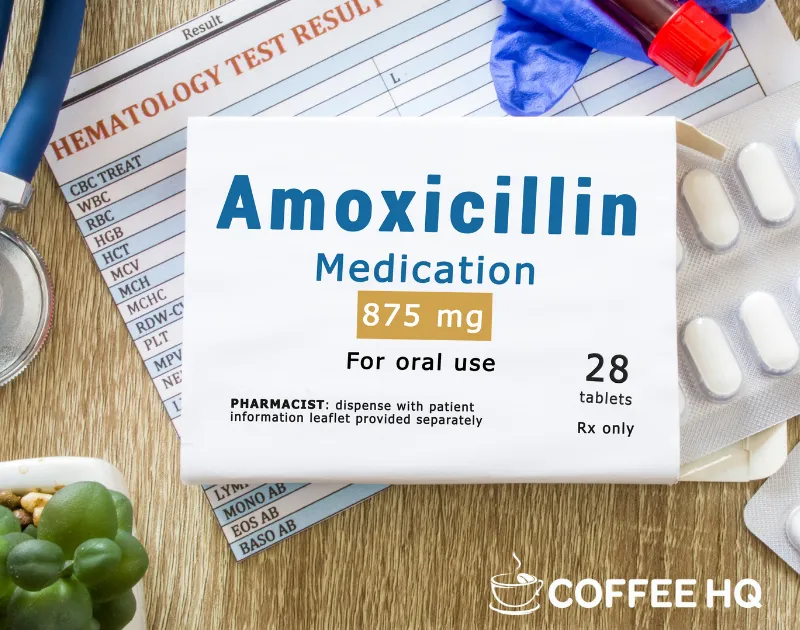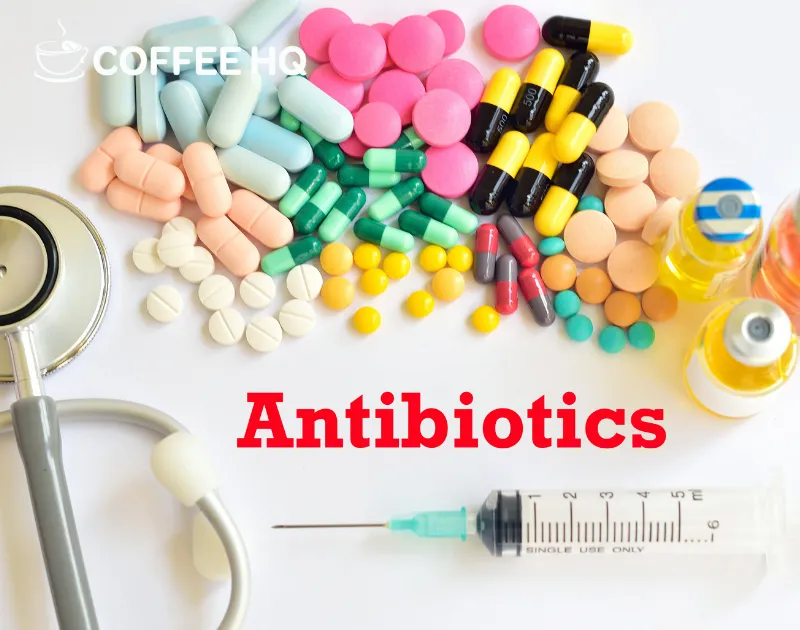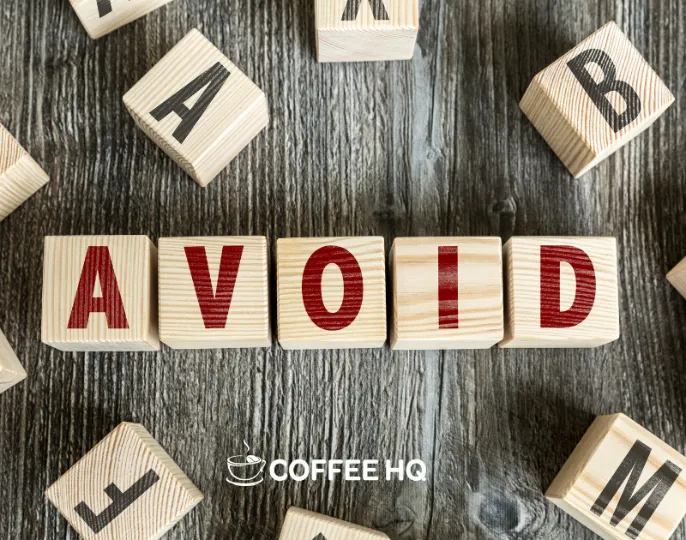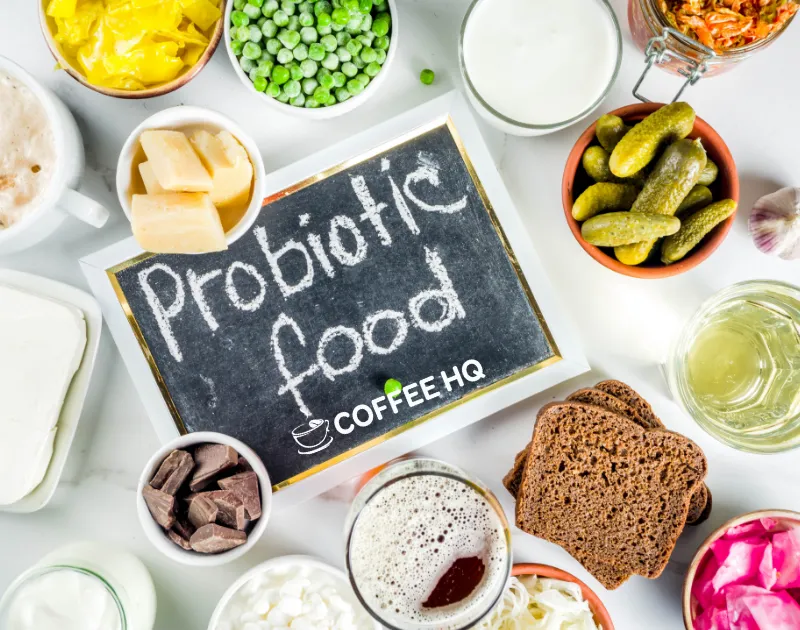Will Drinking Coffee Affect Amoxicillin? – Our Ultimate Guide
When prescribed antibiotics by our doctors we have to be careful about what we are drinking and consuming to make sure there are no interactions, and caffeine could potentially be a bad mix if taken at the same time.
Drinking coffee while taking amoxicillin antibiotic treatment is typically fine and there are no reported drug interactions, however, a caffeinated beverage can be broken down much slower if you are under antibiotic therapy.
To ease any worries about the effects of coffee on antibiotic treatment such as amoxicillin we have made a small guide below which will take you through which antibiotics should not be mixed with the effects of coffee, how coffee works like a drug, what foods to avoid when taking this antibiotic treatment and some pros and cons of the effects of coffee when you are sick.
So without further ado, let’s get into the guide!
What Is Amoxicillin Used For?
Before we get into our guide about caffeine and amoxicillin, we need to discuss what this drug is used for so as you see whether or not is effective for you.
Amoxicillin is typically prescribed for bacterial infections and is a penicillin-like antibiotic that is most commonly used to treat; Pneumonia; bronchitis and infections of the nose, throat and even UTIs.
It’s typically taken twice a day or once a day depending on what you are sick with and should start to make you feel better from your illness within a couple of days max.
Which Antibiotics Are Affected By Caffeine?
Amoxicillin antibiotic treatment does not have any effects or interactions with caffeine from coffee, meaning you can have your cup of coffee without any issues in the morning, some studies do say a cup of coffee might be broken down by your body slower, however.
This begs the question, which antibiotics are affected by caffeine then?
Well, most first-line antibiotics are not affected by the compounds in coffee but some stronger drugs such as Ciprofloxacin are affected by caffeine and the effects of coffee, these have a black label warning about their drug interactions.
We’ve listed a few other drugs to avoid with caffeine below but always check with your doctors for advice before using coffee in conjunction with your antibiotics.
- Enoxacin (Penetrex).
- Norfloxacin (Chibroxin, Noroxin).
- Sparfloxacin (Zagam).
- Trovafloxacin (Trovan).
- Grepafloxacin (Raxar).
Can Coffee Effect How Amoxicillin Works?
Having a cup of coffee will not affect amoxicillin treatment in particular but it can affect the potency of other antibiotics and make them weaker, which is not what you need when you are already sick as your body is trying to fight against a virus.
Mostly, instant coffee when mixed with antibiotics will have an effect on the caffeine side rather than the antibiotics side, the slow absorption can increase the effects of caffeine and make you shaky and even increase anxiety, the same goes for energy drinks too as they also contain caffeine.
How Does Coffee Work As a Drug?
Many people wonder how caffeine works like a drug, caffeine is technically a psychoactive drug that can change how your mind works and acts as a stimulant, it is mostly compared to Adenosine, which will discuss below to see how caffeine works.
Adenosine is an organic compound, it is most known for helping to regulate your body’s brain and mood, our receptors in our brain bind with these to create effects. When Adenosine is bonded with A1 receptors it can help to relax you, and when bound with the A2A receptor it promotes the dopamine in your brain to help with mood.
Caffeine comes in here and works by interrupting the Adenosine and giving you a boost of energy, this stops you from feeling drowsy for some time. Once the caffeine wears off this is when you start to feel tired again.
Can I Use Coffee To Take My Amoxicillin Medication?
It is best to have coffee an hour before or after taking your antibiotics as it is possible for the tannins of the coffee to bind to your medication.
We suggest not taking your antibiotics with coffee and with water instead as the heat of the coffee can sometimes cause the capsule of the medication to melt and reduce its absorption.
What Should I Avoid When Taking Amoxicillin?
If you are taking Amoxicillin for bacterial infections then you might be wondering what food and drink you should avoid while taking the drug, one most known food to avoid while taking antibiotics is citrus fruit as it can interfere with enzymes in your body.
We’ve listed a few medications to watch out for below.
- Acenocoumarol.
- Allopurinol.
- Methotrexate.
- Phenindione.
- Warfarin.
You should also avoid –
- Alcohol – Having alcohol when on antibiotics is a big no-no, it can lead to stomach aches and nausea as well as reduce the effectiveness of your antibiotics.
- Too much calcium – Too much calcium in your diet could potentially block the effects of your antibiotics.
- Sugars and yeast – Candida is a common infection amongst women who are taking antibiotics, to prevent yourself from getting an infection also avoid foods that are high in sugar and yeast.
Can I Drink Decaffeinated Coffee While Taking Amoxicillin?
Decaffeinated coffee is just like regular coffee except it has 97% of the caffeine removed from it, this is done by washing the beans in water for a few hours then adding solvent to take off any caffeine residue, the solvent then floats to the top and is removed.
Since decaffeinated coffee has a very minor amount of caffeine there is no reason as to why you can’t drink it with amoxicillin and other antibiotics since the stimulant inside of it is not present.
Can I Drink Tea While Taking Amoxicillin?
As well as coffee, you might be wondering if it’s okay to drink tea while you are taking amoxicillin, normal tea is typically regarded as fine but should be avoided with the medications we mentioned above as it contains caffeine.
One type of tea to avoid when taking the antibiotics above is green tea as it can also have trouble being broken down by the body when it is under medication, although, it is said it some studies that green tea can help you fight against bad bacteria so could be great to combine with other antibiotics such as amoxicillin.
Advantages & Disadvantages Of Consuming Coffee When Your Sick
You might not think much about your cup of instant coffee in the morning, but the truth is, although coffee is packed with benefits, it also has a few drawbacks with are worth considering too.
We’ve listed the main pros and cons of consuming instant coffee and caffeine when you are sick below.
Advantages
- Keeps you alert – Caffeine can boost your performance by 10% and keep you stimulated and alert when you feel tired, it helps with focus while exercising as well while working.
- Can be used for weight loss – Having a cup of coffee can help to suppress your appetite and lose weight, it also releases fatty acids which can help you to lose weight.
- Helps with pain – Caffeinated coffee supplementation with medication such as painkillers can make them more effective in blocking pain. This is why some companies such as Panadol offer medications with some mg of caffeine.
- Boosts your mood – If you are feeling tired or sick, caffeine triggers a release of dopamine in your brain to give you a mood boost.
Disadvantages
- It can cause an upset stomach – One of the main drawbacks to coffee when you are sick is that it can irritate your stomach lining which can cause you to have diarrhoea, so if you’re already suffering from a stomach bug and you on antibiotics, taking caffeine should be avoided at all costs.
- Increases anxiety – Too much caffeine can lead to an increased heart rate and even heart palpitations, this can also give you the shakes and increase anxiety.
- You can overdose – It is possible to overdose on caffeine and the effects can be life-threatening, it can also give you chest pain, confusion and convulsions.
- Potentially blocks medication potency – As we mentioned above, caffeinated coffee supplementation while taking antibiotics can stop how effective antibiotics are by reducing their potency, this is quite uncommon, however.
Food & Drinks To Consume While Taking Amoxicillin
If you are looking for ways to boost the effectiveness of your amoxicillin then you could try and eating and drinking certain foods.
We’ve bullet-pointed a few of the best ones to help boost your health below.
- Probiotics – Kefir, yoghurt and milk are all great probiotics and can help illnesses such as an antibiotic-related yeast infection.
- Prebiotics – These are best for building healthy gut bacteria and minimising bad bacteria in your body.
- Yoghurt & fermented milk – Both of these contain lactobacilli which are great bacteria to ward off sickness.
- Kiamichi – Rich in bifidobacterial this food can help promote better digestion, fermented soy products also help with this.
- Coconut oil – Coconut oil contains very healthy fatty acids and is great for helping yeast infections!
- Vitamin K – Get your vitamin K is by eating your eggs and leafy greens, although rare, it is possible to get a deficiency in this if you are on antibiotics for a long period.
Tips For Using Amoxicillin Properly
As well as avoiding some foods and drinks, you must be taking amoxicillin correctly too, this will be briefed by your doctors but we’ve also listed a few tips to keep you on track down below.
- Avoid stress – The more you allow your body to chill, the better it will be in fighting off an infection, try to keep cortisol levels low while your take your antibiotics.
- Don’t stop – Even if you feel better, it is important not to stop your course of amoxicillin halfway through, if you do it could lead to potential drug resistance.
- Stay hydrated – You should keep hydrated when taking your amoxicillin, especially if your having caffeine too as you need to stay hydrated for your body to heal properly.
- Try not to miss a dose – You must try not to miss a dose of your antibiotics when you’ve been prescribed a course, if you do it’s best to not try and take two and just wait till your next dose instead if you are worried do call your doctor.
- Expect some side effects – When taking amoxicillin it is possible to have some digestive side effects, don’t be too concerned if you get any and consult the overleaf for checking common side effects.
- Don’t share your meds – Even if you are used to a certain prescription or have taken it previously, you should always consult your doctors before you start taking antibiotics again.
Frequently Asked Questions About Drinking Coffee With Amoxicillin
How long does amoxicillin take to work?
Depending on the dosage of your amoxicillin you should start to feel better within two days or as specified by your doctor.
Do antibiotics make the coffee stronger?
Antibiotics do not technically make the coffee stronger, but it does make it harder to break down in your body which can lead to increased caffeine side effects for a longer period.
Can I take amoxicillin without food?
Amoxicillin is a type of antibiotic that can be had with or without food, it is always best to have something on your stomach beforehand though as it could potentially make some users nauseous.
What are some complex interactions of coffee with antibiotics?
If you drink caffeine with antibiotics you shouldn’t it can cause health issues such as palpations or even death, not to mention it will ruin the effectiveness of the medication.
Any meds with a black label or stated to interact with caffeine avoid mixing for your safety.
What drinks have beneficial bacteria with antibiotics?
Green tea is a great drink to have with antibiotics such as amoxicillin as it also can help to fight off bad bacteria thanks to its herbal properties. Kombucha may also be a great choice since it is loaded with good bacteria.
Which vitamins should I avoid when taking amoxicillin?
We would avoid taking calcium in particular when using this drug as excess calcium can block its effectiveness.
How does caffeine act as a stimulant?
Caffeine stimulates your brain by blocking Adenosine in your body from your receptors which causes a sleepy mood, this instead gives you a boost of energy until the caffeine wears off, the more caffeine you have then the longer this stimulation will last.
What should I not eat when taking antibiotics?
We would avoid eating citrus fruits while taking antibiotics as well as foods that are high in sugar and yeast as this can increase the chances of a yeast-related infection.
How do I stop an antibiotic yeast-related infection?
Ways to try and stop an antibiotic yeast-related infection is by eating foods with better bacteria such as yoghurt, we would also suggest cutting down yeast related foods if the worse gets to worse it might be best to use cream too.
Does caffeine help when you are ill?
Caffeine will unlikely directly help you when you are ill but it can give you a boost of energy and act as a stimulant if you are feeling a little tired.
It is also proven to give you a mood boost by promoting a hormone called dopamine.
How much caffeine can cause an overdose?
Having more than 150-200mg per kg of bodyweight could potentially cause a caffeine overdose in your body, however for different people, it can take more or less as everyone’s body processes the drug differently.
Last Words
Overall, to conclude our guide, drinking caffeine in moderation while taking amoxicillin has no side effects and can be safely combined without any worries.
We would suggest avoiding caffeine however if you are taking certain antibiotics such as Allopurinol and always consult your doctor beforehand if you are not sure about anything. Avoid foods such as citrus fruits and alcoholic drinks while you are on an amoxicillin course.
